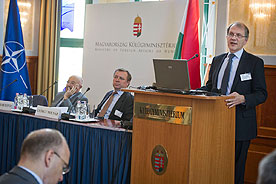Non-proliferation, arms control and disarmament – the focus of first big meeting with Partners after Chicago
The Annual NATO Conference on Weapons of Mass Destruction (WMD) Arms Control, Disarmament and Non-proliferation, hosted this year by the Hungarian Ministry of Foreign Affairs, was opened in Budapest on 14 June. For the eighth time, this landmark non-proliferation event brought together senior officials from countries on five continents as well as from international organizations and academic institutions.

A few weeks after the Chicago Summit, the Conference gathered 130 top level non-proliferation officials from some 60 countries and organizations. “The fact that so many of you have come to take part shows that we face serious, persistent challenges in this area. But it is also a strong demonstration of our resolve to work together to meet these challenges”, said the Deputy Secretary General, Ambassador Alexander Vershbow, addressing the event in a live video link from Brussels. He reiterated that the proliferation of weapons of mass destruction (WMD), as well as their means of delivery “threatens our shared vision of creating the conditions necessary for a world without nuclear weapons, in accordance with the goals of the Nuclear Non-Proliferation Treaty”.

The Hungarian Minister of Foreign Affairs, Mr. János Martonyi, highlighted in his opening remarks that the Conference is “bringing together representatives from all over the world, in an informal setting, where we can freely exchange views on some very demanding WMD-related topics”. He also recalled that “cooperative security”, as one of the three core tasks enshrined in NATO’s Strategic Concept “means that the Alliance will engage actively with its partners to enhance international security by contributing inter alia to arms control, non-proliferation and disarmament”.
NATO Assistant Secretary General for Emerging Security Challenges, Ambassador Gábor Iklódy, Chairman of the Conference, emphasized that “our gathering today could hardly be timelier. The proliferation landscape is getting ever more complex and worrying”. Ambassador Iklódy outlined the cases of serious proliferation concern which have all been in the spotlight of the UN Security Council and the specialized international organizations in recent years and which continue unabated thus putting the non-proliferation regime at risk. He also emphasized though that “while these developments do give rise to serious and legitimate concern, we need to note the strength of positive developments, too. These include the New START Treaty, the Seoul Nuclear Security Summit, or the consultations on the WMD-free zone in the Middle East”.
More than 20 high-level speakers made presentations on the wide range of WMD proliferation aspects and set the ground for the ensuing open and in-depth informal debate where all participants could share their views on the four general themes:
- The future of multilateral non-proliferation regimes and initiatives;
- Current regional proliferation threats and challenges;
- Terrorism and WMD proliferation;
- NATO’s contribution to international efforts in the area of WMD arms control, disarmament and non-proliferation.
Participants in the Conference came from NATO member states and partner nations across the globe, including from the Euro-Atlantic Partnership Council, Mediterranean Dialogue, Istanbul Cooperation Initiative, as well as a number of countries from Asia and the Pacific. Among the international organizations there were speakers and participants from the United Nations, the European Union, the Organization for the Prohibition of Chemical Weapons (OPCW), the Organization for Security and Cooperation in Europe (OSCE), and the Comprehensive Nuclear-Test-Ban Treaty Organization (CTBTO) whose Executive Secretary, Ambassador Tibor Tóth, was the keynote speaker at the dinner reception.
Previous events on the challenges of WMD proliferation were held in Rome (2004), Sofia (2005), Vilnius (2007), Berlin (2008), Warsaw (2009), Prague (2010), and Bergen (2011). The Budapest Conference, however, saw an unprecedented number of participants from 30 partner nations, as well as a high proportion of attendance of Ambassadors and non-proliferation Directors from capitals. As in previous years, the Conference was held under Chatham House rules.
